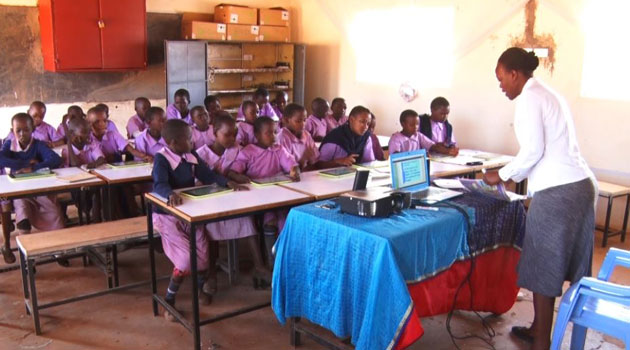
The programme has seen about 150 teachers trained as master trainers, 2,555 trained as Trainer of Trainers (ToTs) and 62,000 primary teachers trained as of December 2015/KEVIN GITAU
Each team will have 10 experts who have been picked from the ICT Authority, Teachers Service Commission, Jomo Kenyatta University of Agriculture and Technology, Moi University and the Education Ministry among other government sectors.
The teams will be overseen by the 400 ICT graduates who fall under the Presidential Digital Talent programme.
“We will have two graduates in every sub-county. We plan to cover 10 schools per sub-county in October. In November and December, we will cover every school in every single location,” Mugo says.
Additionally, more than 22,000 schools have been connected to the power grid.
He points out that the teams have enhanced their skills from the initial roll-out stage, mainly involving Cabinet Secretaries and Permanent Secretaries, which has so far reached 400 schools countrywide.
The CEO allayed fears over the safety of the devices, saying proper protection measures have been put in place.
As seen in Ilbissil, the schools are required to have a computer lab that has a metallic cabinet, for safe storage.
The Ministry of Education gave out money to schools for the acquisition of strong and high-quality storage cabinets according to Mugo.
“We also have burglar-proof classes to ensure the devices are safe,” he assured.
To troubleshoot the devices, the CEO says teachers have already been trained on how to do minor repairs, with a call centre available to give directions.
“In case of major repairs, engineers will be sent to schools and if they are not successful, the devices will be taken back to the local assemblies and then back to the schools.”
He at the same time revealed that pupils in private primary schools will be able to benefit from the devices at cheap rates.
“While the government is handling all the cost aspects in public schools, private schools will have to acquire the tablets on their own but at subsidized price,” he stated.
“They will also get the content from KICD (Kenya Institute of Curriculum Development) or online. Some are actually already using the content.”
Jomo Kenyatta University of Agriculture and Technology and Moi University, which are separately assembling the devices locally, are already in talks with schools on how they can directly source the tablets from the assemblies.
The Digital Literacy Programme, whose implementation kicked off late last month, targets to deliver 1.2 million devices to Class One pupils in all the 23,951 schools by December this year.









































